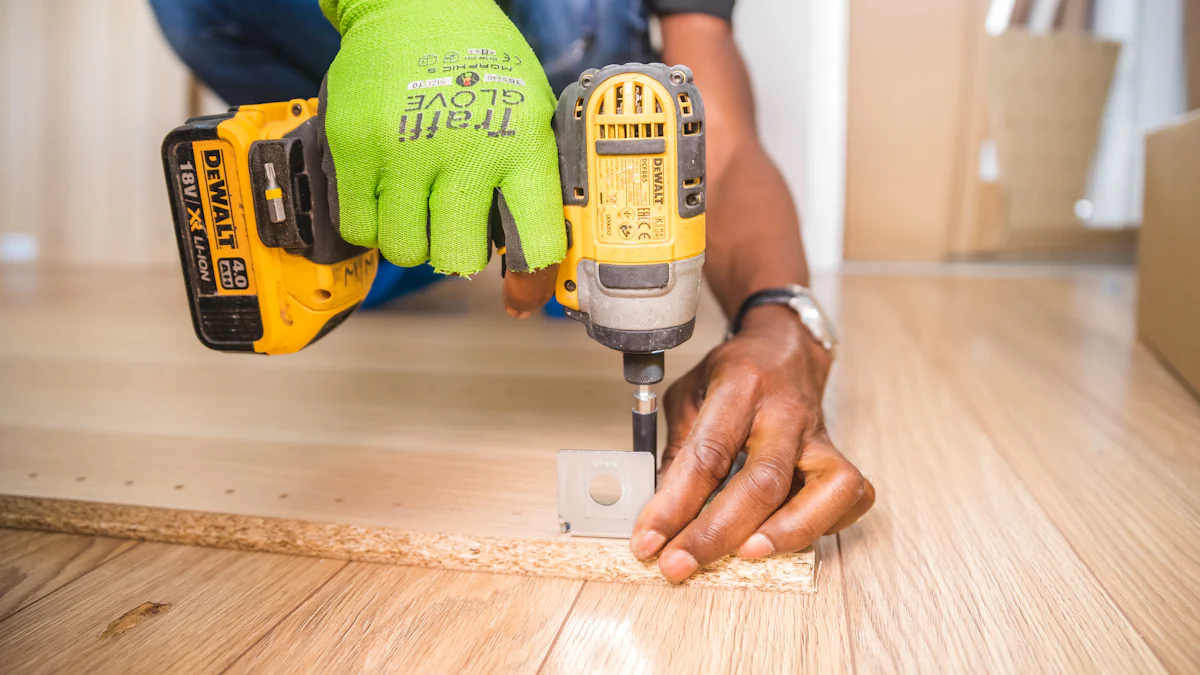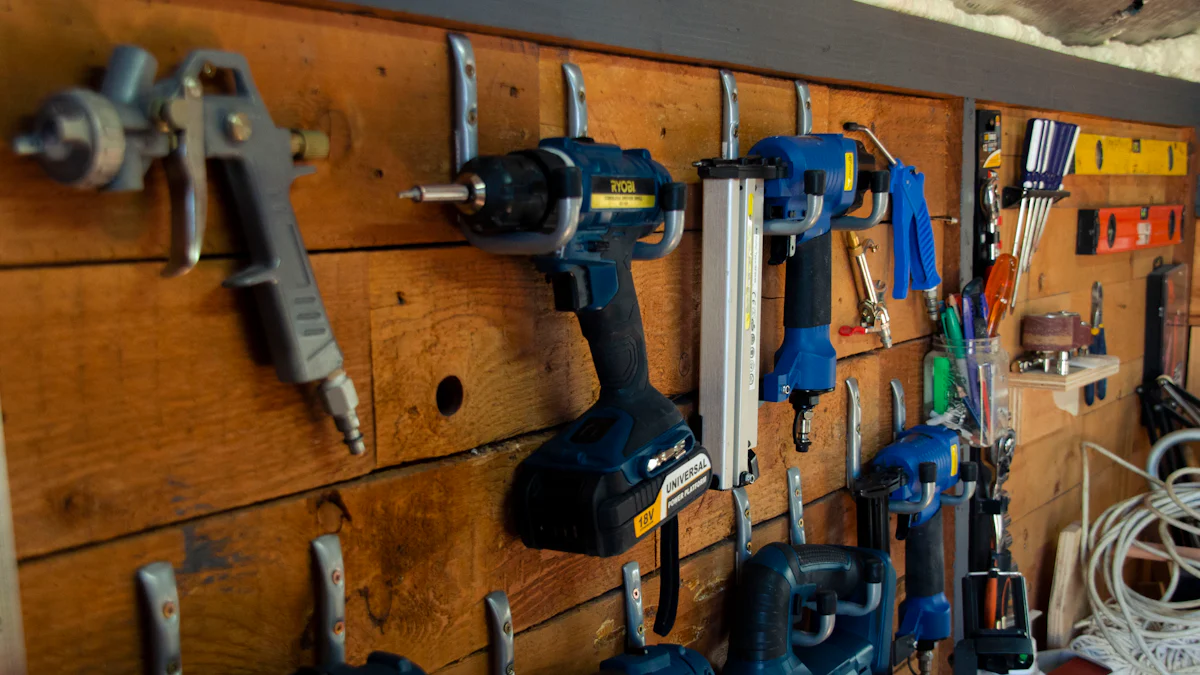
Choosing the right hardware tool ensures quality craftsmanship in woodworking. The woodworking tools market is growing rapidly, with a projected CAGR of 10.07% to reach $10.024 billion by 2028. This growth highlights the importance of selecting top brands. Evaluating hardware tools involves assessing performance, innovation, and value. Technological advancements in 2024 will shape the future of woodworking. Manufacturers focus on integrating new features to meet the rising demand for customized furniture. A well-chosen hardware tool enhances efficiency and precision, making it essential for every woodworker.
Criteria for Evaluation
Evaluating woodworking tool brands requires a focus on several key criteria. Each aspect plays a vital role in determining the best hardware tool for your needs. Understanding these criteria ensures informed decisions when selecting tools.
Performance
Performance stands as a crucial factor in evaluating any hardware tool.
Durability
Durability measures how well a hardware tool withstands wear and tear over time. High-quality materials contribute to longer-lasting tools. Woodworkers benefit from durable tools that endure extensive use without frequent replacements. Brands offering robust tools often gain a reputation for reliability.
Precision
Precision defines the accuracy of a hardware tool in executing tasks. Accurate cuts and measurements enhance the quality of woodworking projects. Tools with high precision levels allow woodworkers to achieve professional-level results. Brands that prioritize precision often receive positive reviews from users.
Innovation
Innovation drives the evolution of hardware tools, introducing new capabilities and efficiencies.
Technological Advancements
Technological advancements in hardware tools lead to improved functionality. Innovations such as brushless motors and smart features enhance tool performance. Brands investing in technology often set trends in the woodworking industry. These advancements cater to the growing demand for efficient and versatile tools.
New Features
New features in hardware tools provide added convenience and usability. Ergonomic designs and user-friendly interfaces improve the woodworking experience. Brands incorporating innovative features stand out in the competitive market. These features often address specific needs of modern woodworkers.
Value for Money
Value for money assesses the cost-effectiveness of a hardware tool in relation to its features and performance.
Pricing
Pricing plays a significant role in choosing a hardware tool brand. Affordable options attract budget-conscious woodworkers. However, higher-priced tools may offer superior quality and features. Comparing prices helps identify the best value for your investment.
Warranty and Support
Warranty and support reflect a brand’s confidence in its hardware tools. Comprehensive warranties provide peace of mind to users. Reliable customer support enhances the overall ownership experience. Brands offering strong warranties often build trust with their customers.
Top Woodworking Tool Brands

Dewalt
Overview
Dewalt stands as a prominent name in the woodworking industry. The brand offers a wide range of high-quality power tools. Dewalt tools are known for their durability and reliability. Professionals and DIY enthusiasts often choose Dewalt for its performance. The company originated in 1924 and is owned by Stanley Black & Decker.
Key Products
Dewalt’s product line includes several essential woodworking tools:
- Miter Saws: Known for precision and ease of use.
- Table Saws: Offer stability and accuracy for large projects.
- Drills: Provide power and versatility for various tasks.
- Sanders: Ensure smooth finishes on wood surfaces.
Strengths and Weaknesses
Dewalt tools excel in durability and innovation. The brand incorporates advanced technology in its hardware tools. Users appreciate the long-lasting nature of Dewalt products. However, some users find Dewalt tools to be on the pricier side. Despite this, the investment often proves worthwhile due to the quality offered.
Milwaukee
Overview
Milwaukee has gained a reputation for robust and durable power tools. The brand provides a diverse range of tools suitable for woodworking. Milwaukee tools are trusted by professionals for their reliability. The brand focuses on integrating cutting-edge technology into its hardware tools.
Key Products
Milwaukee offers several key products that stand out:
- Drills and Impact Drivers: Known for their long battery life.
- Circular Saws: Deliver powerful cutting performance.
- Saws and Sanders: Provide versatility for various woodworking tasks.
Strengths and Weaknesses
Milwaukee tools are praised for their durability and innovative features. The brand’s commitment to technology enhances tool performance. Users often highlight the long battery life of Milwaukee products. Some users may find the tools slightly heavy, affecting portability. Overall, Milwaukee remains a top choice for those seeking reliable hardware tools.
Bosch
Overview
Bosch is recognized as a premium brand in the woodworking sector. The brand offers a wide array of high-quality hardware tools. Bosch tools are favored for their precision and engineering excellence. Professionals and hobbyists alike trust Bosch for its consistent performance.
Key Products
Bosch’s lineup includes several noteworthy products:
- Routers: Known for precision and control.
- Jigsaws: Offer versatility in cutting shapes and curves.
- Planers: Ensure smooth and even surfaces on wood.
Strengths and Weaknesses
Bosch excels in providing precise and well-engineered tools. The brand’s focus on quality makes it a preferred choice for many. Users appreciate the ergonomic designs of Bosch hardware tools. However, Bosch tools can be more expensive compared to other brands. Despite the cost, the quality and precision often justify the price.
Makita
Overview
Makita has established itself as a leader in the woodworking industry. The company is renowned for its innovative approach to hardware tools. Makita focuses on integrating advanced technology into its products. The brand’s commitment to quality ensures reliable performance. Woodworkers often choose Makita for its cutting-edge solutions.
Key Products
Makita offers a diverse range of hardware tools that cater to various needs:
- Brushless Drills: Known for efficiency and long-lasting power.
- Cordless Saws: Provide flexibility and ease of use.
- Planers: Deliver smooth finishes with precision.
- Sanders: Ensure even surfaces on woodworking projects.
Strengths and Weaknesses
Makita tools excel in innovation and reliability. The brand’s focus on brushless technology enhances tool performance. Users appreciate the lightweight design of Makita products. Some users may find the pricing slightly higher than other brands. However, the investment often proves worthwhile due to the advanced features offered.
Ryobi
Overview
Ryobi stands out as a budget-friendly option in the woodworking market. The brand provides a wide range of affordable hardware tools. Ryobi tools are known for their user-friendly designs. Hobbyists and DIY enthusiasts often prefer Ryobi for its cost-effectiveness. The brand’s focus on accessibility makes it a popular choice.
Key Products
Ryobi’s product lineup includes several essential hardware tools:
- Cordless Drills: Offer convenience and portability.
- Circular Saws: Known for affordability and ease of use.
- Jigsaws: Provide versatility for various cutting tasks.
- Sanders: Deliver satisfactory results for basic projects.
Strengths and Weaknesses
Ryobi excels in providing value for money. The brand’s affordable pricing attracts budget-conscious woodworkers. Users appreciate the ease of use and accessibility of Ryobi tools. Some users may find the durability lacking compared to premium brands. Despite this, Ryobi remains a reliable choice for those seeking economical options.
Comparative Analysis
Performance Comparison
Dewalt vs Milwaukee
Dewalt and Milwaukee both excel in performance. Dewalt tools offer durability and precision, making them ideal for professional projects. Milwaukee tools provide robust power and long battery life. Users often choose Milwaukee for heavy-duty tasks. Dewalt tools deliver consistent precision in cuts and measurements. Milwaukee tools handle demanding jobs with ease. Both brands ensure high-quality craftsmanship in woodworking.
Dewalt vs Bosch
Dewalt and Bosch compete closely in performance. Dewalt tools are known for their rugged build and reliability. Bosch tools offer precision and engineering excellence. Users appreciate Dewalt’s ability to withstand tough conditions. Bosch tools deliver accurate results in intricate woodworking tasks. Dewalt provides a balance of power and precision. Bosch focuses on delivering high-quality finishes. Both brands cater to professionals seeking reliable hardware tools.
Milwaukee vs Bosch
Milwaukee and Bosch both prioritize performance. Milwaukee tools offer power and durability for various tasks. Bosch tools provide precision and control in woodworking projects. Users favor Milwaukee for its robust construction and battery life. Bosch tools excel in delivering smooth and accurate cuts. Milwaukee handles demanding projects with efficiency. Bosch ensures detailed and precise work. Both brands remain top choices for woodworkers seeking quality hardware tools.
Innovation Comparison
Dewalt vs Makita
Dewalt and Makita lead in innovation. Dewalt integrates advanced technology into its tools. Makita focuses on brushless motors and battery advancements. Users appreciate Dewalt’s smart features and ergonomic designs. Makita tools offer efficiency and long-lasting performance. Dewalt sets trends with innovative solutions. Makita provides cutting-edge technology for modern woodworkers. Both brands push the boundaries of hardware tool innovation.
Milwaukee vs Makita
Milwaukee and Makita both emphasize innovation. Milwaukee tools feature cutting-edge technology and design. Makita offers advanced battery systems and brushless motors. Users value Milwaukee’s commitment to integrating new features. Makita tools provide flexibility and versatility in projects. Milwaukee leads with innovative solutions for professionals. Makita ensures efficient and reliable performance. Both brands continue to innovate in the hardware tool industry.
Bosch vs Makita
Bosch and Makita excel in innovative features. Bosch tools focus on precision engineering and user-friendly designs. Makita emphasizes advanced technology and durability. Users appreciate Bosch’s ergonomic and precise tools. Makita tools offer long-lasting power and efficiency. Bosch leads with innovative solutions for detailed work. Makita provides reliable and versatile tools for various tasks. Both brands remain at the forefront of hardware tool innovation.
Value for Money Comparison
Dewalt vs Ryobi
Dewalt and Ryobi differ in value for money. Dewalt tools offer premium quality and durability. Ryobi provides affordable options without sacrificing quality. Users find Dewalt worth the investment for professional use. Ryobi appeals to budget-conscious woodworkers. Dewalt ensures long-lasting performance and reliability. Ryobi offers cost-effective solutions for hobbyists. Both brands cater to different needs in the hardware tool market.
Milwaukee vs Ryobi
Milwaukee and Ryobi present distinct value propositions. Milwaukee tools deliver high performance and durability. Ryobi offers economical choices for beginners and DIY enthusiasts. Users choose Milwaukee for professional-grade tools. Ryobi attracts those seeking affordable and user-friendly options. Milwaukee provides robust solutions for demanding tasks. Ryobi ensures accessibility and convenience. Both brands meet diverse needs in the hardware tool industry.
Bosch vs Ryobi
Bosch and Ryobi offer varied value for money. Bosch tools provide precision and engineering excellence. Ryobi delivers affordable and practical solutions. Users favor Bosch for high-quality and detailed work. Ryobi appeals to those seeking budget-friendly tools. Bosch ensures reliable performance for professionals. Ryobi offers accessible options for casual woodworkers. Both brands cater to different segments in the hardware tool market.
The review of top woodworking tool brands highlights key differences in material, durability, and performance. Dewalt and Milwaukee excel in professional-grade tools. Bosch offers precision and engineering excellence. Makita provides innovative brushless technology. Ryobi stands out as a budget-friendly option.
